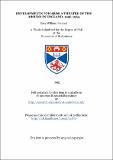Developments towards a theatre of the absurd in England, 1956-1964
Abstract
In 1961 Martin Esslin created the term 'Theatre of the Absurd' as a working hypothesis, a device with which to make fundamental traits present in the plays of a number of France-based dramatists accessible to discussion by tracing the features they had in common. Despite the popularity of Esslin's study, there has been no comparable discussion of England-based absurdism. An explanation for this lack of critical attention may be found in the dogged insistence amongst scholars that there are only two absurd playwrights in the English theatre before 1967. My first aim in this thesis is to redress the imbalance in critical literature, to demonstrate that there existed in England, in the late 1950s and early 1960s, an indigenous expression of absurdism far broader and significantly more complex than that which has been recognised by theatrical reviewers during the past thirty years. Having identified an indigenous absurdism, I go on to challenge the generalisations and over-simplifications surrounding the English 'absurd', which are a product of its critical marginalisation and neglect. I discuss the complexities of the evolution of the English 'absurd', and the ramifications of its development, paying due regard to the theatrical, historical and social factors which shaped its early growth. The playwrights who represent the genre are examined in tum, and attention is devoted to the details of the development of an absurd dynamic within their works. The study falls into three parts. Part I attempts to explain why the English 'absurd' had such a limited impact within its own country up until the late 1960s. It is revealed that many of the writers of the English 'absurd' were incapable of divorcing their plays from the social-orientated drama which dominated English theatre in the late 1950s. The cross-fertilization of an overtly social theatre and absurdism resulted in an expression of the genre which was modified and, to an extent, compromised by its adherence to external, political realities. The focus shifts, in the second part, to accommodate those neglected writers of the English 'absurd' who managed to avoid such compromises and who created a more abstract theatre, the aesthetic and epistemological intentions of which resemble those of the French absurd. Part III explains why, despite the relative obscurity of the English 'absurd', a fragmented absurdism managed to be absorbed into the permanent vocabulary of dramatic expression in England in the 1960s. This final section examines the works of a number of non-absurd writers who took on isolated absurd devices as part of an experiment with the parameters of drama, thereby bringing those techniques into mainstream theatre.
Type
Thesis, PhD Doctor of Philosophy
Collections
Items in the St Andrews Research Repository are protected by copyright, with all rights reserved, unless otherwise indicated.

